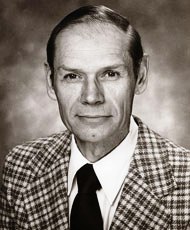(d. 28 August 2010)
The University of North Carolina at Chapel Hill Herbarium (NCU) has cataloged about 80 vascular plant specimens and 2 fungal specimens collected by E. Gibbes Patton. It is likely that as cataloging continues, more specimens collected by him will be found. He frequently collected with Paul W. Titman.
Ernest Gibbes Patton, who went by “Gibbes,” earned a B. A. from Yale University, M.A. from the University of North Carolina at Chapel Hill, and Ph.D. from Duke University. He joined the faculty of Wofford College in 1963, and retired from that institution in 1987.1
Patton’s thesis advisor at UCN-Chapel Hill was J. E. Adams, and the title of his Master’s Thesis was “Influence of flax root byproducts on higher plants.” The title of his doctoral thesis at Duke University was “The development of white pine forest and soil on abandoned farm lands in the North Carolina Blue Ridge.”
“Dr. E. Gibbes Patton, a professor of botany at Wofford [College] for 25 years and a faithful and effective advocate for environmental causes of across the Upstate, died Aug. 28, 2010 in Spartanburg. He was 86 years old.

A native of Greenville, S. C., Patton had an impressive educational background. He earned a bachelor’s degree from Yale University in 1947, a Master’s degree from the University of North Carolina [at Chapel Hill] in 1950, and a doctoral degree from Duke in 1956. After teaching at the University of Alabama, he came to Wofford [College] in 1963 as the college’s first full-time specialist in botany. His colleagues, Dr. Ray Leonard and Dr. Don Dobbs, already were legendary teachers and when Bill Hubbard joined the department in 1964, a memorable team was in place to educate several generations of Wofford physicians and research scientists.
John Lane ’77 describes Patton’s almost immediate impact at the college in an essay called, “The Greening of Wofford.” Serving as a member of a campus panel in the winter of 1970 that address the problem of pollution in South Carolina, Patton used his five-minute opening statement to ask four simple questions. Can we learn to see the environment as a whole? Can we limit resources consumption? Do we understand the natural cycle? What is the role of the college in defining these problems? It was a manifesto for sustainability that was well ahead of its time.
Patton retired from the faculty in 1987, but he always was active in doing research and writing about environmental issues and supporting a wide range of environmental advocacy organizations in the Upstate. His leadership was crucial in the early efforts to protect the watershed of Lawson’s Fork Creek, and it was appropriate that his memorial service was held at Wofford’s Goodall Environmental Studies Center.
Gibbes Patton was married for 59 years to the late Mildred Connor Read Patton and is survived by four children, Charlotte Patton Tinsley ’75, Ernest G. “Buzz” Patton, Jr. ’77, C. Read Patton and Stephen L. Patton.”2
Partial List of Publications:
Patton, Ernest Gibbes. 1950. Influence of flax root byproducts on higher plants. M.A. thesis, Botany Department, University of North Carolina at Chapel Hill.
Patton, E. Gibbes. 1956. The development of white pine forest and soil on abandoned farm lands in the North Carolina Blue Ridge. Ph.D. Thesis, Botany Department, Duke University, Durham, North Carolina.
Jones, Alice Simms and E. Gibbes Patton. 1966. Forest, “prairie,” and soils in the Black Belt of Sumter County, Alabama, in 1832. Ecology 47(1): 75-80.
Patton, E. Gibbes. 1970. Environmental teach-ins. The American Biology Teacher 32(3): 176.
Patton, E. Gibbes. 1971. Declaration of Independence from science fairs. The American Biology Teacher 33(2): 110.
Sherburne, E. G., Jr. and E. Gibbes Patton. 1971. In support of science fairs. The American Biology Teacher 33(6): 361.
Sources :
1. Faculty Gallery. https://www.wofford.edu/library/archives/content.aspx?id=452413 accessed on 13 March 2017.”
2. Dr. E. Gibbes Patton, Aug. 28, 2010. Wofford Today, Fall 2010, p. 30. Office for Communications & Marketing, Wofford College.